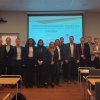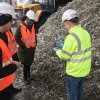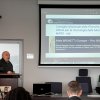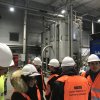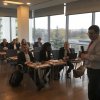On November 21, the Central Mining Institute - National Research Institute held a meeting inaugurating the research project entitled Development of hydrogen-oriented municipal waste refinery based on a novel borehole gasification process combined with advanced gas separation techniques - HydroMine.
The main goal of the HydroMine project is to develop the basis for an innovative gasification technology for the high-energy fraction of municipal waste (Refuse Derived Fuel - RDF) aimed at producing gas with a high hydrogen content. The gasification technology being developed is based on the borehole method implemented in a large-size fixed bed and is based on techniques and experience previously gained in the area of in-situ coal gasification. Advanced membrane and adsorption techniques as well as catalytic-plasma enrichment will be used to separate hydrogen from the gas obtained by gasification.
As the project coordinator, Dr. Krzysztof Kapusta, emphasizes that hydrogen plays a key role in industry because it is used in many basic chemical processes, such as oil refining, ammonia and methanol synthesis, and also as a fuel for fuel cells in modern transport. Currently, most hydrogen in the world is produced from fossil fuels, mainly by steam reforming of natural gas. The global hydrogen generation market was valued at USD 135.94 billion in 2021 and is expected to grow to USD 219.2 billion by 2030.
Municipal waste, especially its high-energy fraction - RDF, is considered a potential raw material for the gasification process aimed at producing hydrogen-rich gas. However, gasification of RDF fuel in commercial gasification reactors encounters a number of difficulties related mainly to the need of appropriate preparation of feedstock and the instability of RDF properties over time. The technology proposed in the project will avoid the above-mentioned difficulties.
The technology being developed also fits perfectly into the assumptions of the circular economy, as the hydrogen produced in the HydroMine process can be reused for chemical syntheses, e.g. methanol, ammonia or plastics - emphasizes Dr. Krzysztof Kapusta.
The HydroMine project is financed under EU Research Fund for Coal and Steel and the implementation period is 2023-2026. The project consortium consists of two Polish partners: Central Mining Institute - National Research Institute and MASTER Odpady i Energia Sp. z o. o. and 5 foreign institutions: GFZ Helmholtz Center Potsdam (Germany), Consiglio Nazionale Delle Ricerche (CNR-ITM, Italy), University of Mons (Belgium), Materia Nova (Belgium), IPAS (Belgium). GIG plays a role of HyroMine project coordinator.

